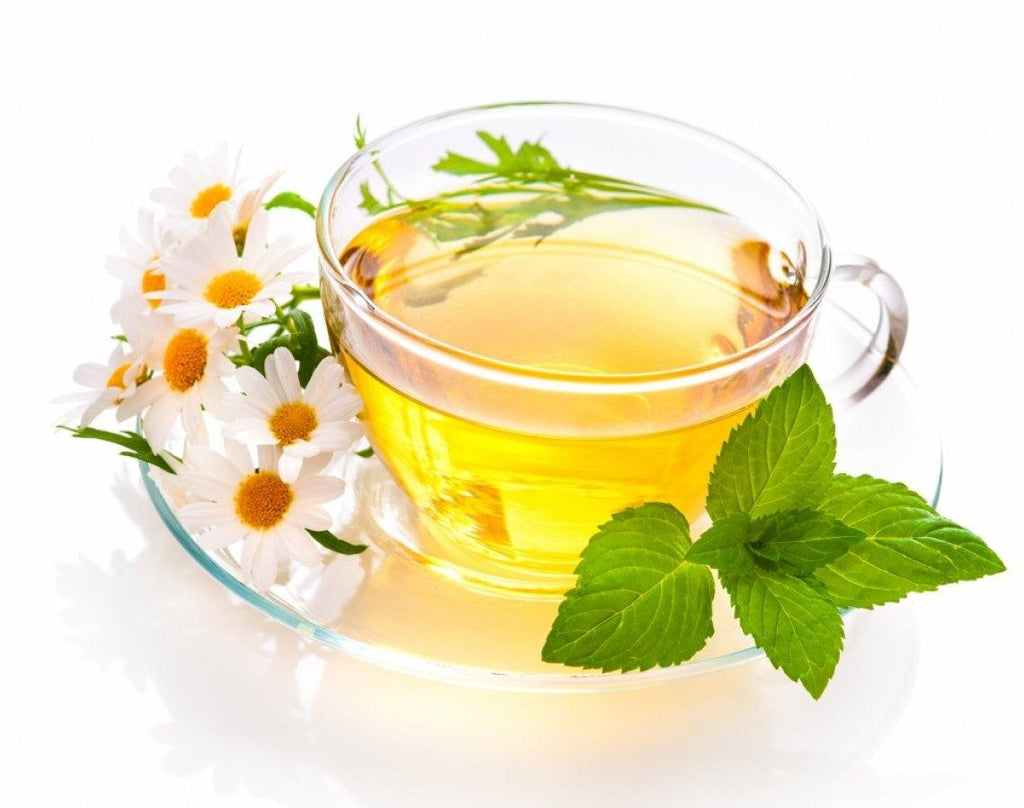Organic and Natural Teas That May Help You Fall Asleep

People love tea. If provides a similar boost as coffee in alertness, but has less caffeine. Therefore, it doesn't interfere with sleep as much as coffee might, and you can enjoy it later on during the day ― unlike with coffee, which you should stop drinking around 2pm. But, can tea really help you fall asleep? And, do those so-called "sleepytime" and "bedtime" teas really work?
Herbal and organic teas have various benefits other than simply being relaxing. Herbs have been able to treat ailments naturally for thousands of years. Some evidence even points to our ability to absorb nutrients can actually increase as we sleep. Therefore, if you select an herbal tea with nutritional properties, you could provide your body with some added benefits.
But, if you're looking for organic or natural teas that will help you fall asleep, or help with sleep in general, here are some you can try.
1. Chamomile
For years, individuals have been using chamomile as a natural remedy to:
- Decrease anxiety
- Reduce inflammation
- Treat insomnia
In fact, it's commonly regarded as a sleep inducer or mild tranquilizer. Its sedative effects could be attributed to its abundant apigenin content (an antioxidant). This antioxidant binds to certain brain receptors that could reduce anxiety and initiate sleep.
One study involving nursing home residents found those who took 400 mg of chamomile extract each day had a substantially better quality of sleep than those who didn't take any.
2. Lavender
Lavender is a type of herb frequently touted for its aromatic and calming scent. In older times, Romans and Greeks would frequently add some lavender to their baths, breathing in the calming and soothing fragrance. People use the flowering plant’s purple buds to make lavender tea. While it's now grown all over the world, it's originally native to the Mediterranean area. Many individuals drink tea to:
- Settle their nerves
- Relax
- Sleep
There's research available to support these benefits.
One study involving 80 Taiwanese postnatal females found those who drank lavender tea, and smelled lavender each day for a couple of weeks, reported less fatigue than those who didn't drink the tea.
Another study involving 67 females with insomnia showed reductions in heart rate variability, heart rate, and improvements in sleep after they inhaled lavender for 20 minutes twice a week for 12 weeks.
3. Valerian
Look for "sleepytime" or "nighttime" teas with valerian, which is a root with certain soothing properties. Research shows that taking valerian root before bedtime speeds up the process due to its sedative-like effect. It's also especially helpful since it won't interfere with REM sleep. So, you won't wake up the next morning with that "morning-hangover" feeling that some sleep aids cause.
4. Lemon Balm
Lemon balm tea has an herbal, citrusy flavor that doesn't smell too lemony, and is pleasant. Although citrus is considered energizing, lemon balm actually helps reduce anxiety because of its anti-anxiety or anxiolytic properties. Also, it could help relieve indigestion, which can disrupt sleep.
5. Decaf Green Tea
Decaf green tea is a healthy selection, and serves as a great bedtime alternative if you don't like the taste of herbal teas.
It has theanine, which helps to reduce stress, improving sleep. Pure L-theanine can help with better sleep efficiency, and leave you with a more energized mental state when you wake up.
6. Catnip Tea
Catnip has been used for a long time to make tea. It belongs to the mint family, and has culinary uses like other mints. Catnip tea helps:
- Insomnia
- Drowsiness
- Promotes relaxation
You can find it in specialty tea shops, grocery stores and health-food stores.
7. Passionflower Tea
Passionflower works well for individuals with anxiety and obsessive thoughts, due to its ingredient that provides anti-anxiety benefits. It's typically combined with another calming herb. Drink passionflower tea an hour before your bedtime to help you get a better night’s sleep. Passionflower has high levels of specific chemicals that have an impact on your nervous system, making you drowsy, and improving your sleep quality.
8. St. John’s Wort Tea
St. John's Wort is often used for treating depression, and could help insomniacs with comorbid depression. Similar to lemon balm, researchers believe St. John's Wort stimulates the GABA receptors, which helps jump start the sleep process.
9. Spearmint Tea
Spearmint is an anti-inflammatory that's frequently added to sleepytime teas to give them flavor; however, it also soothes headaches and indigestion, which could cause insomnia.
10. Hops Tea
Chances are when you think of the term “hops” what comes to mind is making beer. It’s what gives beer its bitter taste. However, hops are the hop plant’s female flowers, and aren’t only for beer. They actually have a long herbal medicine history. They’re used for treating a wide range of ailments, and can help calm your nerves, relieve your stress, and relax your body. This makes hops tea perfect as a bedtime beverage to help you sleep.
11. Magnolia Bark Tea
Magnolia bark has been used for centuries in Asia to calm nerves and anxiety. It's active compound magnolol works like a mild sedative.
While there isn’t any “concrete” evidence showing that drinking herbal or organic tea can promote better sleep, there are many reports of individuals finding success falling asleep after they’ve drank a cup; therefore, it’s difficult to ignore the theory.
Link to Us!
If you found this article useful and shareable, please copy and paste the following into the html code of your website or blog:
Learn More About Going Green at the <a href="https://www.plushbeds.com/blogs/green-sleep/organic-and-natural-teas-that-may-help-you-fall-asleep">PlushBeds Latex Mattress Blog</a>.
*Please note that we DO NOT accept guest blog posts. Any inquiries into this will be respectfully left unanswered.
The post Organic and Natural Teas That May Help You Fall Asleep appeared first on PlushBeds Latex Mattress Blog.
